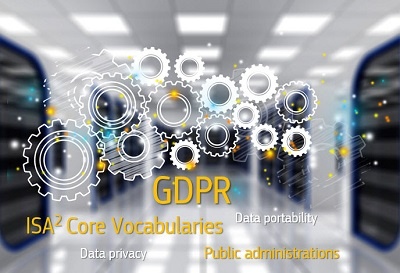GDPR Data Portability and Core Vocabularies published: read new ISA2 study
07/12/2018

The General Data Protection Regulation (GDPR) - presented by the European Commission (EC) in January 2012 - was adopted by the EC to protect individuals from unintentional and intentional misuse of personally identifiable information (PII). On May 25th, in the year 2018, the GDPR went into effect. GDPR applies not only to organizations in the EU, but to any organization doing business with EU citizens, in fact, any organization processing or storing data for individuals within the EU.

ISA² Action 2016.07 SEMIC: Promoting semantic interoperability amongst the EU Member States) developed a new study on the GDPR Data Portability and Core Vocabularies that examines the use and application of Core Vocabularies and, more specifically, the Core Person Vocabulary as a potential enabler for the GDPR data portability.
The study investigates how the use of existing specific semantic tools, specially the Core Person Vocabulary, could allow public administrations to ensure that personal data are transmitted in a structured, commonly used, and machine-readable format and that data formats are interoperable.
Right to Data Portability
The right to data portability allows data subjects to obtain personal data they have provided to a data controller in a structured, commonly used and machine-readable format as well as to transfer such data to a different controller. The main purpose of this new right is to strengthen the control of data subjects over their personal data. As such, the main elements of data portability are:
- the right to receive personal data;
- the right to transmit personal data from one data controller to another data controller; and
- strengthened control of the data subject over his data.
Data controllers are expected to transmit personal data in an interoperable format. As such, ‘structured, commonly used and machine-readable’ are means for enabling data portability, while interoperability is the desired outcome.
Core Vocabularies
Core Vocabularies, as ‘simplified, re-usable and extensible data models that capture the fundamental characteristics of a data entity in a context-neutral and syntax-neutral fashion’, are examples of such solutions to enable data portability from a technical point of view and provide means to transmit personal data in an interoperable format.
Read the full version of the GDPR Data Portability and Core Vocabularies study HERE
RELATED:
- The General Data Protection Regulation (GDPR) : what is it all about?
- GDPR & What It Means For Researchers (recorded LIBER webinar, 2018)
- GDPR guide for Open Journal Systems users
- Data processing principles: the 9 GDPR principles relating to processing personal data
It is also worthwhile to shortly touch on the issues the GDPR could raise by the FAIR principles and “FAIRified” research data stewardship practice:
- The FAIR guiding principles for data stewardship: fair enough?
- From the Top 10 FAIR Data Things Global Sprint. Take a look at dedicated GITHUB space
|
FAIRsharing Registry and Recommendations: Interlinking Standards, Databases and Data Policies (feedback ends 10 December, 2018) Register for DANS Webinar : FAIR data in practice: From FAIRy tale to FAIR enough. The webinar takes place on 11 December, 2018, at 15:00 CET. The main language during the webinar will be English. 12 December 2018: Scientific Symposium: FAIR Data Science for Green Life Sciences, Wageningen Data Competence Center |
- FAIR PRINCIPLES TO ALL ELEMENTS OF AGRICULTURAL-RELATED RESEARCH PROCESSES. FOCUS on Agricultural Data Interest Group (IGAD) | RDA11 meeting
- DATA COLLECTION IN AFRICA: STATE OF THE ART, CHALLENGES & SOLUTIONS. FOCUS on Agricultural Data Interest Group (IGAD) | RDA12 meeting
- IASSIST 2019 Conference : Call for proposals "Data Down Under: Exploring DATA FIRSTS” (applications will close 23 December, 2018)
- ISA2 VocBench 3 helps managing multilingual controlled vocabularies in an interoperable way
- Achievements, impact and strategy for AGROVOC’s future (AGROVOC is edited by the web-based platform VocBench, - an advanced collaboration web environment for maintaining thesauri, ontologies, code lists and authority resources, providing features such as history, validation, a publication workflow, and multi-user management with role-based access control)
You are welcome to Sign up for AIMS News, follow @AIMS_Community on Twitter... And, thanks again for your interest !
